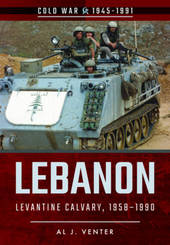
|
Lebanon: Levantine Calvary, 1958-1990
Paperback / softback
Main Details
| Title |
Lebanon: Levantine Calvary, 1958-1990
|
| Authors and Contributors |
By (author) Al J. Venter
|
| Physical Properties |
| Format:Paperback / softback | | Pages:128 | | Dimensions(mm): Height 234,Width 156 |
|
| Category/Genre | The Cold war
Military history |
|---|
| ISBN/Barcode |
9781526707826
|
| Classifications | Dewey:956.9204 |
|---|
| Audience | |
|---|
| Illustrations |
80 b/w & 30 colour illustrations
|
|
Publishing Details |
| Publisher |
Pen & Sword Books Ltd
|
| Imprint |
Pen & Sword Books Ltd
|
| NZ Release Date |
19 February 2018 |
| Publication Country |
United Kingdom
|
Description
When the world held its breath It is 25 years since the end of the Cold War, now a generation old. It began over 75 years ago, in 1944-long before the last shots of the Second World War had echoed across the wastelands of Eastern Europe-with the brutal Greek Civil War. The battle lines are no longer drawn, but they linger on, unwittingly or not, in conflict zones such as Iraq, Somalia and Ukraine. In an era of mass-produced AK-47s and ICBMs, one such flashpoint was the Levant It is axiomatic that the recent history of much of the Eastern Mediterranean is linked to the creation of the state of Israel in May 1948, incontestably so. The country emerged from a series of conflicts and these have continued intermittently ever since, fuelled as much by Arab Israeli enmity, national pride and territorial aspirations as hostile neighbours. Syria, Jordan, Lebanon and Egypt and in the latter phases, Iran were all part of it. There were rich pickings in the regions for the two great powers of the Cold War as they aligned with one side or the other, the Soviets in full support of Arab interests and the Jewish State enjoying the support of Washington. That combination not only led to several Middle Eastern wars but, as we are able to observe in today's news reports, the knock-on effect continues in Lebanon, Jordan, Egypt and Syria especially. For much of the period under review it was Lebanon that took the brunt of it, with resident Christian, Sunni, Shi'ite as well as Israeli interests deploying multiple levels of force much of it clandestine to jockey for predominance. Throughout, land, sea and air forces were involved. AUTHOR: Al J. Venter is a specialist military writer and has had 50 books published. He started his career with Geneva's Interavia Group, then owners of International Defence Review, to cover military and related developments in the Middle East and Africa. Venter has been writing on these and related issues such as guerrilla warfare, insurgency, the Middle East and conflict in general for half a century.
Author Biography
Al J. Venter is a specialist military writer and has had 50 books published. He started his career with Geneva s Interavia Group, then owners of International Defence Review, to cover military and related developments in the Middle East and Africa. Venter has been writing on these and related issues such as guerrilla warfare, insurgency, the Middle East and conflict in general for half a century. He was involved with Jane s Information Group for more than 30 years and was a stringer for the BBC, NBC News (New York) as well as London s Daily Express and Sunday Express. He branched into television work in the early 1980s and produced more than 100 documentaries, many of which were internationally flighted. His one-hour film, Africa s Killing Fields (on the Ugandan civil war), was shown nationwide in the United States on the PBS network. Other films include an hour-long programme on the fifth anniversary of the Soviet invasion of Afghanistan, as well as AIDS: The African Connection, nominated for China s Pink Magnolia Award. His last major book was Portugal s Guerrilla Wars in Africa, nominated in 2013 for New York s Arthur Goodzeit military history book award. It has gone into three editions, including translation into Portuguese.
ReviewsVenter was embedded with several of the combatants and had access to the major players in Lebanon. The text opens with a useful timeline and has been generously illustrated with photographs (many being the author's own), diagrams and maps. This is a concise, well-written monograph that takes its place in the coverage of the hotly contested Middle East.-- "RUSI Defence Systems"
|